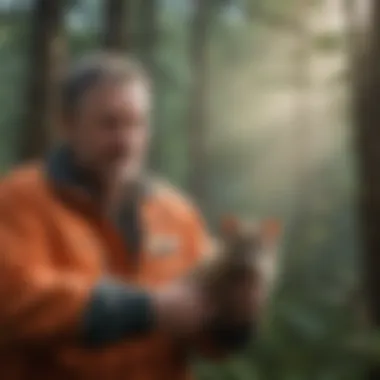Unlocking Career Opportunities with a Wildlife Biology Degree


Wildlife Biology: Exploring Career Opportunities
- Key Points: This article explores the various job prospects awaiting individuals with a wildlife biology degree, offering insights into field research, conservation efforts, and more. It caters to those interested in environmental conservation and wildlife preservation, providing a comprehensive guide to career opportunities within the realm of wildlife biology.
Evergreen Trees Species
- Types of Evergreen Trees: Delve into the diverse species of evergreen trees prevalent in American forests, ranging from majestic pines to resilient cedars.
- Ecological Significance: Explore the ecological importance of evergreen trees, from providing year-round habitat to offering crucial food sources for wildlife.
- Conservation Practices: Highlight key conservation methods employed to safeguard and preserve the delicate balance of evergreen tree species in forest ecosystems.
Forest Management Techniques
- Wildlife Habitat Preservation: Discover effective strategies for maintaining biodiversity within forested habitats, ensuring the protection of diverse wildlife species.
- Sustainable Logging Practices: Explore responsible timber harvesting methods that promote sustainable forestry operations while mitigating environmental impact.
- Fire Prevention Measures: Gain insights into advanced techniques utilized to prevent forest fires and protect woodland areas through early detection systems.
- Ecosystem Restoration Initiatives: Learn about ongoing projects dedicated to revitalizing degraded lands and fostering resilient ecosystems within forested regions.
Climate Change Impact on Evergreen Forests
- Carbon Sequestration: Understand the vital role of evergreen forests in carbon sequestration, aiding in the global fight against climate change by absorbing carbon dioxide.
- Weather Pattern Effects: Investigate the correlation between climate change and shifts in weather patterns affecting the health and resilience of evergreen forests.
- Biodiversity Support: Explore the intricate ways in which climate change impacts biodiversity and ecosystem dynamics within evergreen forest environments.
- Localized Effects: Delve into the regional consequences of climate change on diverse communities and ecosystems that rely on evergreen forests for sustenance.
Management and Preservation of Evergreen Forests
- Historical Context: Reflect on the rich historical significance of American evergreen forests, tracing back to native practices and cultural traditions.
- Research Findings: Present the latest research discoveries concerning evergreen forest management, emphasizing the critical need for biodiversity preservation and sustainable practices.
- Conservation Efforts Showcase: Highlight impactful conservation initiatives aimed at safeguarding and maintaining the natural beauty and ecological integrity of American evergreen landscapes.
Outdoor Activities in Evergreen Forests
- Hiking Trails Exploration: Embark on a guided tour of serene hiking trails nestled amidst lush evergreen forests, offering unparalleled natural beauty and wildlife encounters.
- Camping Destinations: Discover hidden gems and top camping spots situated deep within the heart of American evergreen forests, perfect for nature enthusiasts and wilderness lovers.
- Nature Photography Opportunities: Immerse yourself in the picturesque scenery of evergreen landscapes, capturing breathtaking moments through the lens of photography in these pristine settings.
- Birdwatching Enthusiasts: Witness the diverse avian species that call evergreen forests home, providing a unique birdwatching experience amidst the tranquil canopy of these majestic trees.
Introduction


Wildlife biology is a field of study that delves into the fascinating realms of animal behavior, ecology, and conservation. In this article, we embark on a journey to explore the numerous career opportunities that await individuals with a wildlife biology degree. From conducting vital research in the field to spearheading conservation efforts, the landscape of wildlife biology careers is vast and deeply impactful. Aspiring wildlife enthusiasts and environmental conservationists stand to gain valuable insights as we navigate through the diverse paths available within this field.
As we delve into the intricacies of careers in wildlife biology, it becomes evident that this sphere offers a unique blend of scientific exploration and hands-on conservation work. Fueled by a passion for nature and a drive to protect and preserve animal species, professionals in this field play a pivotal role in safeguarding our planet's biodiversity and promoting sustainable coexistence between humans and wildlife.
Throughout this article, we will shine a light on the key roles that wildlife biologists, zoologists, environmental consultants, park rangers, marine biologists, and various other professionals play in shaping the future of conservation efforts. By highlighting the vivid spectrum of opportunities available to those with a wildlife biology degree, we aim to provide a comprehensive overview of the vast career landscape waiting to be explored by individuals committed to safeguarding our natural world.
Wildlife Rehabilitation Specialist
Wildlife rehabilitation specialists are frontline caregivers providing essential support to injured, orphaned, or distressed wildlife. In the field of wildlife biology, these professionals focus on rescuing and rehabilitating injured animals, with the ultimate goal of reintroducing them back into their natural habitats. Their work is guided by principles of wildlife welfare, conservation ethics, and ecosystem sustainability.
One of the primary responsibilities of a wildlife rehabilitation specialist is to assess and treat injured wildlife, addressing their medical needs and providing specialized care to support their recovery. Through personalized rehabilitation plans, specialists strive to ensure the physical and behavioral well-being of animals under their care.
Moreover, wildlife rehabilitation specialists work closely with veterinary professionals, conservation organizations, and regulatory agencies to ensure compliance with ethical standards and legal requirements. By combining scientific knowledge with compassionate care, they play a crucial role in contributing to the overall well-being and conservation of wildlife populations.
Zoologist
When exploring career opportunities within the realm of wildlife biology, the role of a Zoologist holds significant importance. A Zoologist focuses on the study of animals, their behavior, habitats, and interactions within ecosystems. This subsection delves into the specific elements that make Zoologist a compelling career choice for individuals with a wildlife biology degree.
In this article, Zoologists play a vital role in understanding and conserving various animal species. By conducting research on animal behavior and ecology, Zoologists contribute invaluable data that aids in wildlife conservation efforts. They help maintain a balance in ecosystems by studying predator-prey relationships, animal migrations, and population dynamics. This subsection emphasizes the critical role Zoologists play in wildlife protection and biodiversity preservation.
Furthermore, being a Zoologist offers a fascinating opportunity to work closely with diverse animal species. Zoologists may specialize in a particular group of animals, such as mammals, birds, reptiles, or amphibians, allowing them to develop in-depth knowledge of specific species and their conservation needs. This specialization can lead to exciting career paths in areas like wildlife management, animal rehabilitation, or even scientific communication roles. The subsection sheds light on the varied career trajectories available to Zoologists, providing insights into potential specializations and job prospects for individuals passionate about working with animals.
Moreover, Zoologists contribute to environmental education and public awareness by sharing their knowledge of animal behavior and ecology with the general public. By engaging in outreach programs, designing educational materials, or conducting wildlife workshops, Zoologists play a crucial role in fostering a deeper appreciation for biodiversity and promoting conservation initiatives. This aspect highlights the broader impact that Zoologists can have in raising awareness about wildlife conservation among different audiences.
Overall, the subsection on Zoologist underscores the multifaceted nature of this career path, showcasing its significance in wildlife biology and conservation efforts. It emphasizes the interdisciplinary skills required, the diverse job opportunities available, and the profound impact Zoologists can have on protecting and preserving animal species and their habitats.
Environmental Consultant


Habitat Restoration Specialist
Within the specialization of Environmental Consulting, the role of a Habitat Restoration Specialist comes to the forefront. Habitat Restoration Specialists focus on the rehabilitation and enhancement of degraded habitats, employing ecological principles to promote biodiversity and ecological balance. Their responsibilities include designing and implementing restoration plans, conducting site assessments, and collaborating with stakeholders to restore areas impacted by human activities or natural disasters. By meticulously planning and executing habitat restoration projects, these specialists contribute significantly to the conservation of wildlife species and the restoration of ecosystem functions.
Land Manager
Another crucial aspect within the domain of Environmental Consulting is the role of a Land Manager. Land Managers are tasked with overseeing and managing lands designated for conservation, recreation, or resource management. They play a key role in developing land management plans, implementing sustainable land use practices, and ensuring the preservation of natural resources. By balancing environmental conservation with societal needs, Land Managers facilitate the sustainable utilization of land while protecting wildlife habitats and promoting biodiversity conservation.
GIS Specialist
In the realm of Environmental Consulting, GIS (Geographic Information System) Specialists contribute significantly to environmental planning and management. GIS Specialists utilize geospatial data and advanced mapping technology to analyze environmental trends, map habitat distributions, and identify conservation priorities. Their expertise aids in spatial decision-making, ecosystem modeling, and spatial analysis to optimize conservation efforts and land-use planning. By leveraging GIS technologies, specialists enhance efficiency in environmental assessment, monitoring, and decision-making processes to support sustainable environmental practices.
Park Ranger
In the realm of careers available to individuals with a wildlife biology degree, the role of a Park Ranger holds a unique and vital position, attracting individuals with a passion for environmental conservation and wildlife preservation. Park Rangers play a pivotal role in safeguarding natural resources, overseeing the protection of wildlife habitats, and ensuring the sustainability of ecosystems within national parks and other wilderness areas.
Importance of Park Ranger in the Article
The inclusion of the Park Ranger profession in this article serves to highlight a crucial aspect of wildlife biology-related career opportunities. Park Rangers serve as stewards of nature, entrusted with the responsibility of maintaining the balance between human recreation and the preservation of natural environments. Their presence is indispensable in ensuring the long-term health and integrity of ecosystems, making them integral members of the conservation workforce.
Specific Elements and Benefits of Being a Park Ranger
One of the key elements that make the role of a Park Ranger significant is their hands-on involvement in wildlife management, environmental education, and visitor safety. Park Rangers engage in a variety of tasks, including conducting wildlife surveys, enforcing conservation laws, and providing guidance to visitors on how to enjoy nature responsibly. This multifaceted role not only enhances their own skills and knowledge but also contributes directly to the protection and sustainability of ecological systems.
The benefits of being a Park Ranger extend beyond individual career growth. Park Rangers have the privilege of working in some of the most beautiful natural settings, gaining firsthand experience in diverse habitats and ecosystems. This exposure not only enriches their understanding of wildlife biology but also fosters a deep connection to the environment, instilling a sense of stewardship and respect for nature.
Considerations about Pursuing a Career as a Park Ranger


Aspiring Park Rangers should be prepared for a demanding yet fulfilling career path. The job may require working in remote locations, facing challenging environmental conditions, and handling unexpected situations with resilience and resourcefulness. Strong communication skills, environmental knowledge, and a commitment to conservation principles are essential traits for success in this role.
Marine Biologist
Marine Biologists conduct diverse research activities, from studying marine species behavior and physiology to evaluating the impact of human activities on marine ecosystems. By collecting data and analyzing the health of marine environments, they help in developing conservation strategies to protect vulnerable species and habitats. The work of Marine Biologists is instrumental in promoting marine biodiversity and advancing our comprehension of the intricate relationships within ocean ecosystems. Therefore, pursuing a career as a Marine Biologist offers not only personal fulfillment but also a chance to make a tangible difference in the preservation of marine life.
Marine Mammal Researcher
As a specialized subset within the field of Marine Biology, Marine Mammal Researchers concentrate on the study of marine mammals such as whales, dolphins, seals, and sea lions. These professionals play a pivotal role in researching the behavior, ecology, and conservation of marine mammal species. Marine Mammal Researchers often conduct fieldwork, observing and documenting the habits and interactions of marine mammals in their natural habitats.
A crucial aspect of the work conducted by Marine Mammal Researchers is to monitor the population dynamics of marine mammal species, assess threats to their survival, and develop strategies for their protection. Through their research efforts, Marine Mammal Researchers contribute valuable insights into the conservation and management of marine mammal populations, aiding in the preservation of these charismatic creatures and their habitats.
Fisheries Biologist
Diving into the realm of Fisheries Biology, Fisheries Biologists focus on studying fish populations, their behavior, and their habitats in both freshwater and marine environments. Fisheries Biologists play a critical role in assessing the sustainability of fish stocks, implementing conservation measures, and monitoring the impact of human activities on aquatic ecosystems.
Fisheries Biologists conduct research to understand fish population dynamics, devise strategies for sustainable fishing practices, and evaluate the health of aquatic ecosystems. By studying factors such as fish migration patterns, breeding habits, and responses to environmental changes, Fisheries Biologists contribute to the conservation of fish species and the long-term viability of fisheries.
Aquatic Ecologist
Within the domain of Aquatic Ecology, Aquatic Ecologists explore the interactions between organisms and their aquatic environments, encompassing both freshwater and marine ecosystems. Aquatic Ecologists examine the physical, chemical, and biological components of aquatic systems, elucidating the complex relationships that influence aquatic life.
Aquatic Ecologists play a vital role in assessing water quality, biodiversity, and ecosystem health in aquatic environments. By studying nutrient cycling, pollution impacts, and the resilience of aquatic species, Aquatic Ecologists provide valuable insights for developing effective conservation and management strategies for aquatic ecosystems. The work of Aquatic Ecologists is indispensable for safeguarding the ecological balance of water bodies and ensuring the sustainability of aquatic resources.
Conclusion
In the realm of exploring career opportunities with a degree in wildlife biology, the conclusion acts as a pivotal point of reflection and synthesis. As we unravel the multifaceted nature of wildlife biology careers, we must emphasize the significance of understanding the diverse pathways available to individuals passionate about environmental conservation and wildlife preservation. The conclusion serves as a compass, guiding aspiring professionals towards a deeper comprehension of the possibilities that await them in this field.
One of the key considerations highlighted in this concluding section pertains to the immense societal impact of wildlife biology professionals. By engaging in field research, conservation efforts, and habitat restoration, individuals with a wildlife biology background play a crucial role in safeguarding endangered species, preserving biodiversity, and contributing to the sustainable management of ecosystems. The article illuminates how these professionals serve as stewards of the environment, working tirelessly to address pressing environmental challenges and ensure the well-being of our planet's diverse flora and fauna.
Furthermore, the conclusion underscores the intrinsic value of pursuing a career in wildlife biology, not merely as a job but as a calling driven by a deep-rooted passion for nature and wildlife. This reflective section encapsulates the intrinsic rewards and personal fulfillment that individuals derive from working in harmony with the natural world, underscoring the spiritual and emotional connection that often motivates wildlife biologists beyond monetary gains.
As we draw the curtains on this insightful exploration of career opportunities in wildlife biology, it is essential to recognize the holistic perspective provided throughout the article. Each career pathway discussed offers a unique synergy of academic expertise, practical skills, and field experience, contributing to a comprehensive understanding of the various roles and responsibilities that wildlife biology professionals undertake. This concluding segment serves as a testament to the breadth and depth of opportunities available within the vast expanse of wildlife biology, inspiring individuals to embark on fulfilling careers dedicated to the conservation and protection of our planet's precious natural resources.



